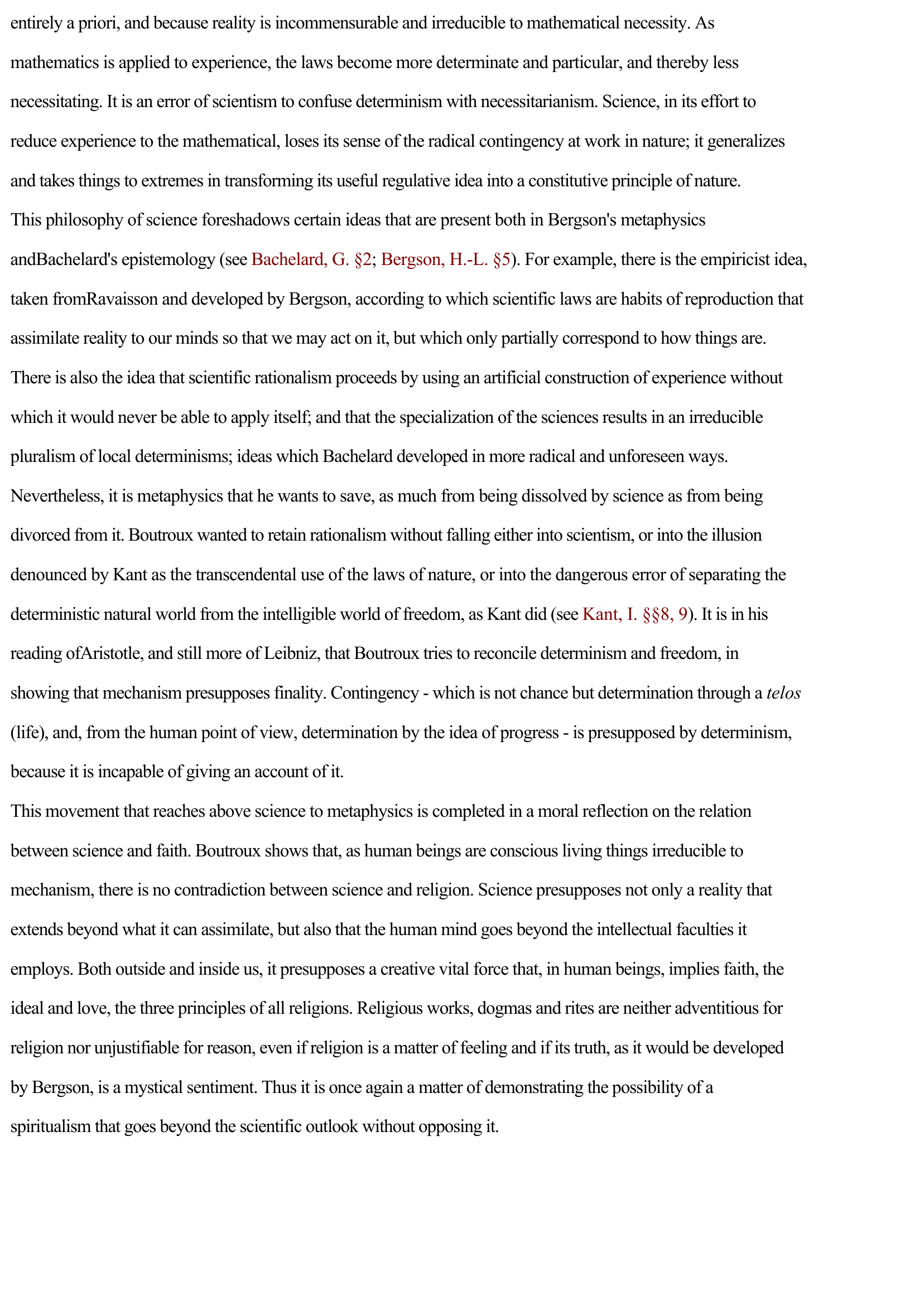Boutroux, Émile
Publié le 22/02/2012

Extrait du document
«
entirely a priori, and because reality is incommensurable and irreducible to mathematical necessity.
As
mathematics is applied to experience, the laws become more determinate and particular, and thereby less
necessitating.
It is an error of scientism to confuse determinism with necessitarianism.
Science, in its effort to
reduce experience to the mathematical, loses its sense of the radical contingency at work in nature; it generalizes
and takes things to extremes in transforming its useful regulative idea into a constitutive principle of nature.
This philosophy of science foreshadows certain ideas that are present both in Bergson's metaphysics
and Bachelard's epistemology (see Bachelard, G.
§2 ; Bergson, H.-L.
§5 ).
For example, there is the empiricist idea,
taken fromRavaisson and developed by Bergson, according to which scientific laws are habits of reproduction that
assimilate reality to our minds so that we may act on it, but which only partially correspond to how things are.
There is also the idea that scientific rationalism proceeds by using an artificial construction of experience without
which it would never be able to apply itself; and that the specialization of the sciences results in an irreducible
pluralism of local determinisms; ideas which Bachelard developed in more radical and unforeseen ways.
Nevertheless, it is metaphysics that he wants to save, as much from being dissolved by science as from being
divorced from it.
Boutroux wanted to retain rationalism without falling either into scientism, or into the illusion
denounced by Kant as the transcendental use of the laws of nature, or into the dangerous error of separating the
deterministic natural world from the intelligible world of freedom, as Kant did (see Kant, I.
§§8, 9 ).
It is in his
reading ofAristotle, and still more of Leibniz, that Boutroux tries to reconcile determinism and freedom, in
showing that mechanism presupposes finality.
Contingency - which is not chance but determination through a telos
(life), and, from the human point of view, determination by the idea of progress - is presupposed by determinism,
because it is incapable of giving an account of it.
This movement that reaches above science to metaphysics is completed in a moral reflection on the relation
between science and faith.
Boutroux shows that, as human beings are conscious living things irreducible to
mechanism, there is no contradiction between science and religion.
Science presupposes not only a reality that
extends beyond what it can assimilate, but also that the human mind goes beyond the intellectual faculties it
employs.
Both outside and inside us, it presupposes a creative vital force that, in human beings, implies faith, the
ideal and love, the three principles of all religions.
Religious works, dogmas and rites are neither adventitious for
religion nor unjustifiable for reason, even if religion is a matter of feeling and if its truth, as it would be developed
by Bergson, is a mystical sentiment.
Thus it is once again a matter of demonstrating the possibility of a
spiritualism that goes beyond the scientific outlook without opposing it..
»
↓↓↓ APERÇU DU DOCUMENT ↓↓↓
Liens utiles
- Boutroux Émile, 1845-1921, né à Montrouge (Hauts-de-Seine), philosophe français.
- « La science n'est pas seulement une connaissance; elle est aussi une éducation. » Expliquez et discutez ce jugement d'Émile Boutroux
- IDÉE DE LOI NATURELLE DANS LA SCIENCE ET LA PHILOSOPHIE CONTEMPORAINES (DE L'), 1895. Émile Boutroux
- Émile ou de l’éducation
- TERRE (la), d'Émile Zola

































